UNIT 3 独立思考(Thinking for yourself)
Think for yourself 新标准大学英语原文
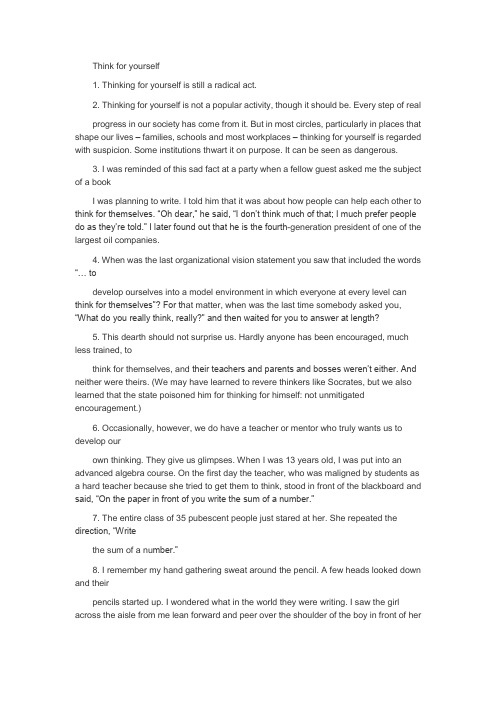
Think for yourself1. Thinking for yourself is still a radical act.2. Thinking for yourself is not a popular activity, though it should be. Every step of realprogress in our society has come from it. But in most circles, particularly in places that shape our lives – families, schools and most workplaces – thinking for yourself is regarded with suspicion. Some institutions thwart it on purpose. It can be seen as dangerous.3. I was reminded of this sad fact at a party when a fellow guest asked me the subject of a bookI was planning to write. I told him that it was about how people can help each other to think for themselves. “Oh dear,” he said, “I don’t think much of that; I much prefer people do as they’re told.” I later found out that he is the fourth-generation president of one of the largest oil companies.4. When was the last organizational vision statement you saw that included the words “… todevelop ourselves into a model environment in which everyone at every level can think for themselves”? For th at matter, when was the last time somebody asked you, “What do you really think, really?” and then waited for you to answer at length?5. This dearth should not surprise us. Hardly anyone has been encouraged, much less trained, tothink for themselves, and their teachers and parents and bosses weren’t either. And neither were theirs. (We may have learned to revere thinkers like Socrates, but we also learned that the state poisoned him for thinking for himself: not unmitigated encouragement.)6. Occasionally, however, we do have a teacher or mentor who truly wants us to develop ourown thinking. They give us glimpses. When I was 13 years old, I was put into an advanced algebra course. On the first day the teacher, who was maligned by students as a hard teacher because she tried to get them to think, stood in front of the blackboard and said, “On the paper in front of you write the sum of a number.”7. The entire class of 35 pubescent people just stared at her. She repeated the direction, “Writethe sum of a nu mber.”8. I remember my hand gathering sweat around the pencil. A few heads looked down and theirpencils started up. I wondered what in the world they were writing. I saw the girl across the aisle from me lean forward and peer over the shoulder of the boy in front of herwho was scribbling something. Then she scratched a figure and immediately covered it with her hand.9. The teacher paced and rubbed the chalk between her fingers. I wondered what she was aboutto put on the board. I was now the only one not writing. I leaned back and over my left shoulder whispered to my friend, “What is it?”10. “Seven,” she whispered back.11. So I wrote “7” on my paper. I kept my head down, hoping I looked busy and confident.12. After the agony among us had become tactile, the teacher asked us for our answers. Thenumber 7 was prevalent. She walked slowly over to the board and wrote: “There is no such thing as the sum of a number.”13. I knew that.14. Why didn’t you write it?15. Sarah said it was 7.16. Why did you ask her?17. Because –I don’t know.18. That’s right. From now on, think for yourself.19. I was too scared around that teacher for the rest of my young life to think very well in herpresence. But I took the message with me and gradually examined and valued it. I don’t recommend humiliating people into thinking for themselves as she had. She certainly did not create a Thinking Environment for us. Had she affirmed our intelligence first and spoken about the joy of thinking for ourselves, had she not fanned our fear of her, we would all have learned even more powerfully what it meant to do our thinking. And we might have been able to think well around her too.20. But at least she introduced the concept into my academic life.presence. But I took the message with me and gradually examined and valued it. I don’t recommend humiliating people into thinking for themselves as she had. She certainly did not create a Thinking Environment for us. Had she affirmed our intelligence first and spoken about the joy of thinking for ourselves, had she not fanned our fear of her, we would all have learned even more powerfully what it meant to do our thinking. And we might have been able to think well around her too.20. But at least she introduced the concept into my academic life.。
think的用法和搭配
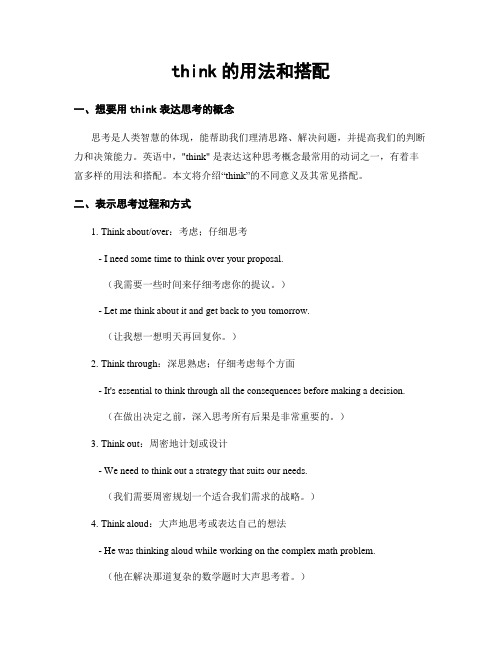
think的用法和搭配一、想要用think表达思考的概念思考是人类智慧的体现,能帮助我们理清思路、解决问题,并提高我们的判断力和决策能力。
英语中,"think" 是表达这种思考概念最常用的动词之一,有着丰富多样的用法和搭配。
本文将介绍“think”的不同意义及其常见搭配。
二、表示思考过程和方式1. Think about/over:考虑;仔细思考- I need some time to think over your proposal.(我需要一些时间来仔细考虑你的提议。
)- Let me think about it and get back to you tomorrow.(让我想一想明天再回复你。
)2. Think through:深思熟虑;仔细考虑每个方面- It's essential to think through all the consequences before making a decision.(在做出决定之前,深入思考所有后果是非常重要的。
)3. Think out:周密地计划或设计- We need to think out a strategy that suits our needs.(我们需要周密规划一个适合我们需求的战略。
)4. Think aloud:大声地思考或表达自己的想法- He was thinking aloud while working on the complex math problem.(他在解决那道复杂的数学题时大声思考着。
)三、表示某种思维活动1. Think of:想起;想到- I can't think of his name right now, but I'll remember it later.(我现在想不起他的名字,但我会记得的。
)- What do you think of this idea? Do you think it will work?(你对这个想法有什么看法?你认为它会奏效吗?)2. Think highly/well/badly of:对...评价很高/很好/很差- My boss thinks highly of my work, and that's why I got promoted.(我的老板对我的工作评价很高,所以我得到了晋升。
新标准大学英语-综合教程1-课文翻译
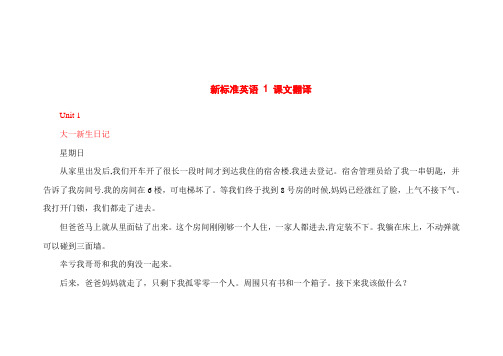
新标准英语 1 课文翻译Unit 1大一新生日记星期日从家里出发后,我们开车开了很长一段时间才到达我住的宿舍楼.我进去登记。
宿舍管理员给了我一串钥匙,并告诉了我房间号.我的房间在6楼,可电梯坏了。
等我们终于找到8号房的时候,妈妈已经涨红了脸,上气不接下气。
我打开门锁,我们都走了进去。
但爸爸马上就从里面钻了出来。
这个房间刚刚够一个人住,一家人都进去,肯定装不下。
我躺在床上,不动弹就可以碰到三面墙。
幸亏我哥哥和我的狗没一起来。
后来,爸爸妈妈就走了,只剩下我孤零零一个人。
周围只有书和一个箱子。
接下来我该做什么?星期一早上,有一个为一年级新生举办的咖啡早茶会。
我见到了我的导师,他个子高高的,肩膀厚实,好像打定了主意要逗人开心。
“你是从很远的地方来的吗?”他问我.他边说话边晃悠脑袋,咖啡都洒到杯托里了。
“我家离爱丁堡不太远,开车大约6个小时,”我说.“好极了!"他说,接着又走向站在我旁边的那个女孩儿.“你是从很远的地方来的吗?”他问.但不等那女孩儿作出任何回答,他就说到,“好极了!”然后就继续向前走.他啜了一口咖啡,却惊讶地发现杯子是空的.妈妈打来电话.她问我是不是见到了导师。
星期二我觉得有点儿饿,这才意识到我已经两天没吃东西了。
我下楼去,得知一天三餐我可以在餐厅里吃.我下到餐厅排进了长队。
“早餐吃什么?”我问前面的男生。
“不知道.我来得太晚了,吃不上早餐了。
这是午餐."午餐是自助餐,今天的菜谱是鸡肉、米饭、土豆、沙拉、蔬菜、奶酪、酸奶和水果。
前面的男生每样儿都取一些放到托盘上,付了钱,坐下来吃.我再也不觉得饿了.妈妈打电话来。
她问我有没有好好吃饭。
星期三早上9点钟我要去听一个讲座.我醒时已经8:45了。
竟然没有人叫我起床。
奇怪.我穿好衣服,急匆匆地赶到大讲堂。
我在一个睡眼惺忪的女生旁边坐下。
她看了看我,问:“刚起床?”她是怎么看出来的?讲座进行了1个小时。
结束时我看了看笔记,我根本就看不懂自己写的字.那个女生名叫苏菲,和我一样,也是英语文学专业的学生。
新视界大学英语综合教程2课后翻译

Unit11 But in most circles, particularly in places that shape our lives – families, schools and most workplaces – thinking for yourself is regarded with suspicion. 然而,在大多数圈子里,尤其是在我们生活中的重要场所——如家庭、学校以及大部分工作场所——独立思考受到人们的质疑。
2 Hardly anyone has been encouraged, much less trained, to think for themselves, and their teachers and parents and bosses weren’t either.很少有人受到鼓励进行独立思考,更别提接受相关的训练,就连他们的老师、父母和老板也是如此。
3 I saw the girl across the aisle from me lean forward and peer over the shoulder of the boy in front of her who was scribbling something.我看见跟我隔着过道的那个女同学向前探了一下身子,从前座男生的肩膀上方偷窥他正在草草写些什么。
4 I was too scared around that teacher for the rest of my young life to think very well in her presence.在后来的青春岁月里,我一见到这位老师就害怕,只要她一出现,我就无法好好思考。
5 Had she affirmed our intelligence first and spoken about the joy of thinking for ourselves, had she not fanned our fear of her, we would all have learned even more powerfully what it meant to do our thinking.如果她能首先肯定我们的聪明才智,跟我们谈谈独立思考的乐趣,如果她没有激起我们对她的畏惧,我们就可以更深切地体会到独立思考的意义。
独立思考的重要性英语作文提纲
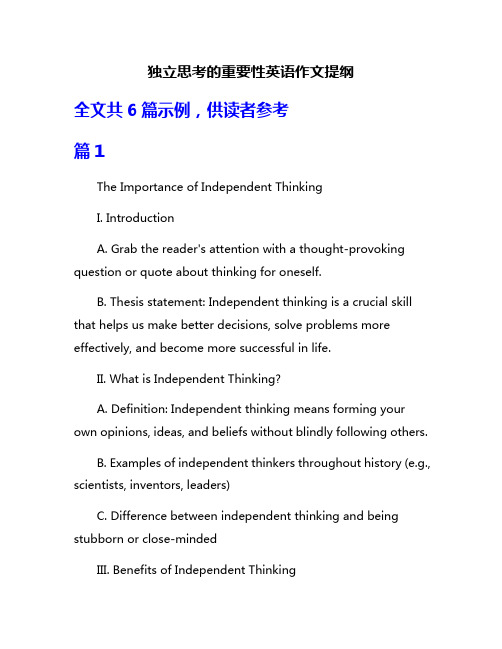
独立思考的重要性英语作文提纲全文共6篇示例,供读者参考篇1The Importance of Independent ThinkingI. IntroductionA. Grab the reader's attention with a thought-provoking question or quote about thinking for oneself.B. Thesis statement: Independent thinking is a crucial skill that helps us make better decisions, solve problems more effectively, and become more successful in life.II. What is Independent Thinking?A. Definition: Independent thinking means forming your own opinions, ideas, and beliefs without blindly following others.B. Examples of independent thinkers throughout history (e.g., scientists, inventors, leaders)C. Difference between independent thinking and being stubborn or close-mindedIII. Benefits of Independent ThinkingA. Better decision-making1. Evaluate information from multiple sources2. Consider different perspectives3. Make informed choices based on your own analysisB. Problem-solving skills1. Think outside the box2. Develop creative solutions3. Adapt to new situationsC. Personal growth and self-discovery1. Develop your own values and beliefs2. Gain confidence in your abilities3. Become more self-aware and self-reliantIV. Independent Thinking in SchoolA. Importance of asking questions and seeking clarificationB. Encourage critical thinking and analysis of informationC. Respect different opinions and perspectivesD. Assignments and projects that promote independent thinking (e.g., research projects, debates)V. Independent Thinking in Daily LifeA. Develop your own interests and hobbiesB. Make informed choices about lifestyle, career, and relationshipsC. Question cultural norms and societal expectationsD. Form opinions on current events and social issuesVI. Challenges of Independent ThinkingA. Peer pressure and conformityB. Fear of being different or standing outC. Overcoming biases and preconceived notionsD. Dealing with criticism or oppositionVII. Strategies for Developing Independent ThinkingA. Read widely and seek diverse sources of informationB. Engage in open and respectful discussionsC. Practice critical thinking and analysisD. Embrace curiosity and ask thoughtful questionsE. Reflect on your own thoughts, feelings, and experiencesVIII. ConclusionA. Restate the importance of independent thinkingB. Encourage readers to embrace their individuality and think for themselvesC. Final thoughts or call to action篇2Here's an outline for an essay on "The Importance of Independent Thinking" in the voice of an elementary school student, approximately 2000 words long, written in English:Title: Why We Should Think for OurselvesIntroduction:Imagine a world where everyone thinks the same way. Boring, right?Independent thinking is like a superpower that lets us see things differently.Thesis: Independent thinking is important because it helps us understand things better, solve problems creatively, and make our own choices in life.Body 1: Understanding Things BetterA. When we think for ourselves, we ask questions and don't just accept what others say.B. We look at things from different angles and don't just believe everything we're told.C. Example: When learning about history, thinking independently means considering multiple perspectives and not just believing one side's story.Body 2: Solving Problems CreativelyA. Independent thinkers don't just follow the crowd; they come up with their own ideas.B. They think "outside the box" and find unique solutions to problems.C. Example: When faced with a math problem, independent thinkers might try different strategies instead of just following the textbook method.Body 3: Making Our Own ChoicesA. Independent thinking means not just doing what everyone else does, but deciding for ourselves.B. We can choose our own interests, hobbies, and paths in life.C. Example: Instead of just following trends, independent thinkers might choose to explore their own unique passions and talents.Counterarguments:A. Some might say that independent thinking can lead to rebellion or disrespect for authority.B. However, independent thinking doesn't mean ignoring rules or being rude; it means making thoughtful decisions.Conclusion:A. Restate the importance of independent thinking for understanding, problem-solving, and making choices.B. Independent thinking helps us become our own person and contribute something unique to the world.C. Encourage others to embrace their independent thoughts and ideas.This outline provides a structure for an essay that explains the importance of independent thinking in a way that elementary school students can understand and relate to. Itincludes examples, counterarguments, and a clear thesis statement to guide the essay.篇3Title: Why It's Important to Think for YourselfIntroduction• Kids are often told by adults what to think and do• But it's really important to learn how to think independently• Independent thinking helps you become a smarter and more creative person• Overview of the key points I'll cover in the essayBody Paragraph 1: What is Independent Thinking?• Defining independent thinking - using your own brain instead of just accepting what others say• Gives examples of independent vs non-independent thinking• Independent thinkers ask questions and analyze things themselvesBody Paragraph 2: Independent Thinking Helps You Learn Better• When you think for yourself, you understand concepts more deeply• You remember things better than just memorizing• Thinking independently helps you apply knowledge in new situationsBody Paragraph 3: It Leads to Better Problem Solving• Independent thinkers can analyze a problem from many angles• They come up with more creative solutions• Examples of how independent thinking cracked tough problemsBody Paragraph 4: It Helps You Form Your Own Opinions• Instead of ju st accepting what others say, you evaluate evidence yourself• You can tell if something is fact vs fiction or someone's opinion• Examples of forming independent opinions on issuesBody Paragraph 5: It Prepares You for Greater Responsibilities• As you get older, you'll need to make more decisions on your own• Independent thinking is crucial for college, career, and life• It helps you become a self-sufficient adultConclusion• Recap the key benefits of independent thinkin g• Inspirational call to action to develop habits of independent thought• Being an independent thinker helps you make the most of your potential篇4Sure, here's an outline for an essay on "The Importance of Independent Thinking" in the tone of an elementary school student, written in English with a length of around 2000 words.Title: Why We Should Think for OurselvesIntroduction:Start with a short story or personal experience that highlights the importance of independent thinking.Explain what independent thinking means in simple terms.Thesis statement: Independent thinking is an essential skill that we should develop from a young age because it helps us make better decisions, solve problems more effectively, and become more responsible individuals.Body Paragraph 1: Independent Thinking andDecision-MakingDescribe a situation where following others blindly led to a poor decision or consequence.Explain how independent thinking could have helped in that situation.Discuss the importance of weighing options and considering different perspectives before making decisions.Body Paragraph 2: Independent Thinking andProblem-SolvingShare an example of a problem you or someone you know faced, and how independent thinking helped find a solution.Explain how independent thinking encourages creativity and out-of-the-box thinking.Discuss the benefits of not relying solely on others' opinions or ready-made solutions.Body Paragraph 3: Independent Thinking and Personal ResponsibilityDescribe a situation where someone showed a lack of independent thinking and blamed others for their actions.Explain how independent thinking promotes taking responsibility for our choices and actions.Discuss the importance of forming our own opinions and beliefs, rather than blindly following others.Body Paragraph 4: Developing Independent Thinking SkillsSuggest ways to encourage independent thinking in children, such as asking open-ended questions, allowing them to explore and experiment, and encouraging them to express their opinions.Discuss the role of parents, teachers, and schools in fostering independent thinking.Emphasize the importance of exposing children to diverse perspectives and teaching them to think critically.Conclusion:Restate the thesis and summarize the main points.Encourage readers to embrace independent thinking and continue developing this skill throughout their lives.End with a inspiring quote or personal reflection on the importance of independent thinking.篇5Title: Why It's Great to Think for Yourself!Introduction:• Do you ever feel like everyone just follows what others say or do?• Independent thinking means using your own brain to form your own opinions and ideas.• It's super important to think independently as it helps you learn, grow, and be your own person.Body 1: What is Independent Thinking?• Not just copying what others say or think.• Questioning things instead of just accepting them.• Using your creativity and imagination.• Forming your own beliefs and views.• Examples of thinking independently (choosing different hobbies than friends, answering questions yourself instead of copying, etc.)Body 2: Why Independent Thinking is Important• Helps you learn better by really understanding things.• A llows you to be creative and innovative.• You become a leader instead of a follower.• Build self-confidence by trusting your own thoughts.• Avoid being misled by rumors or wrong information.Body 3: How to Become an Independent Thinker• Ask lots of questions and don't accept things at face value.• Research topics yourself using books, internet, experts.• Consider different viewpoints before making up your mind.• Have courage to disagree respectfully with others.• Practice independent thinking for schoolwork, hobbies, etc.Body 4: Examples of Great Independent Thinkers• Scientists like Marie Curie and Albert Einstein challenged existing beliefs.• Leaders like Martin Luther King Jr. promoted new ways of thinking.• Inventors like Thomas Edison thought differently to create new things.• Even entertainers like Jim Carrey use independent thinking for creative comedy.Conclusion:• Recap why independent thinking is so beneficial.• Encou rage readers to start thinking for themselves more often.• Independent thinking helps you become a smarter, more creative, and self-confident person.篇6I. IntroductionA. What is independent thinking?1. Coming up with your own ideas2. Not just believing what others tell you3. Using your brain to figure things outB. Why is it important?1. You won't just follow the crowd2. You can learn more by thinking for yourself3. Independent thinkers change the world II. At SchoolA. Don't just copy your friend's answers1. Story about getting in trouble for cheating2. Importance of doing your own workB. Ask questions when you don't understand1. Teachers like curious students2. Don't be afraid to speak upC. Think of new ideas for projects1. Examples of creative projects2. Value of unique thinkingIII. With FamilyA. Have your own opinions1. OK to disagree with parents sometimes2. Give reasons to back up your viewsB. Make your own choices1. Pick some of your own clothes, hobbies2. Learn to decide some things for yourselfC. Learn new skills independently1. Teach yourself using books or internet2. Freedom to explore your interestsIV. As a Good CitizenA. Think critically about rules1. Some rules are outdated or unfair2. Propose changes in a respectful wayB. Don't believe everything you see online1. Lots of misleading information2. Fact-check information from reliable sourcesC. Volunteer and help others1. Figure out how you can contribute2. Use your talents to benefit societyV. ConclusionA. The benefits of independent thinking1. Increased creativity and learning2. More self-confidence and responsibility3. The ability to make positive changesB. Call for more independent thinkers1. The world needs original ideas2. Don't be afraid to think for yourself。
如何成为一个能独立思考的人英语作文

如何成为一个能独立思考的人英语作文How to Become a Person who Thinks IndependentlyIntroduction:Being able to think independently is a valuable skill that can help you navigate through life with confidence and make sound decisions. In today's world, where information is constantly bombarding us from all sides, it is important to develop the ability to filter out the noise and form your own opinions. In this essay, we will discuss the steps you can take to become a person who thinks independently.1. Seek out diverse perspectives:One of the best ways to develop independent thinking is to expose yourself to different viewpoints and perspectives. This can be done by reading books, watching documentaries, listening to podcasts, and engaging in conversations with people who have different ideas than you. By exposing yourself to a variety of opinions and viewpoints, you can begin to form a more well-rounded understanding of the world.2. Question everything:To become a critical thinker, it is important to question everything you see, hear, and read. Don't take information at face value, but instead, ask yourself why you believe what you believe. Challenge your own assumptions and biases, and be open to changing your mind when presented with new evidence. By developing a healthy skepticism, you can avoid falling prey to misinformation and propaganda.3. Develop your own opinions:Instead of parroting what others say, take the time to form your own opinions on various topics. Consider all sides of an argument, weigh the evidence, and come to your own conclusions. It is okay to disagree with popular opinion or to have a unique perspective on a particular issue. The important thing is that your opinions are well-informed and backed up by evidence.4. Learn to think critically:Critical thinking is a key component of independent thinking. It involves analyzing information, evaluating arguments, and making logical conclusions. To improve your critical thinking skills, practice identifying logical fallacies, breaking down complex arguments, and recognizing biases in media andadvertising. By honing your critical thinking skills, you can become a more independent and discerning thinker.5. Be open to feedback:Being able to think independently doesn't mean that you always have to be right. It is important to be open to feedback and criticism from others. Constructive feedback can help you see things from a different perspective and challenge your assumptions. Embrace feedback as an opportunity for growth and learning, rather than as a personal attack.6. Trust your instincts:While it is important to base your opinions on evidence and reason, it is also important to trust your instincts and intuition. Sometimes our gut feelings can provide valuable insights that our rational minds may overlook. Learn to balance logic with intuition and trust your own judgment when making decisions.Conclusion:Becoming a person who thinks independently takes time, effort, and dedication. By seeking out diverse perspectives, questioning everything, developing your own opinions, honing your critical thinking skills, being open to feedback, and trusting your instincts, you can cultivate the ability to think for yourselfand make informed decisions. Independent thinking is a powerful tool that can help you navigate through life with confidence and clarity.。
think相关的短语动词或动词词组

think相关的短语动词或动词词组think about/of sb/sth1、考虑到;关⼼;替…着想Don't you ever think about other people?难道你就从来没有考虑过别⼈?2、考虑,打算(做某事)She's thinking of changing her job.她在考虑换⼯作。
think ahead (to sth) 预先考虑;预想;预先计划Take a tip from Kate and think ahead to what you want.从凯特⾝上得到⼀些暗⽰,提前想想你要什么。
think back (to sth) 回想;追忆I keep thinking back to the day I arrived here.我不断回想起刚到这⼉那⼀天的情景。
think for yourself 独⽴思考;⾃⾏决定It behooves you to think for yourself.你理应为你⾃⼰着想。
think of sth/sb1、想象到;对…有想法When I said that I wasn't thinking of anyone in particular.我说那话时,并没有想到任何具体的⼈。
2、想出;构思出Can anybody think of a way to raise money?谁能想出个集资的办法?Have you thought of a name for the baby yet?你想好给孩⼦起什么名字没有?3、(尤与can连⽤) 记得;想起(没有被动)I can think of at least three occasions when he arrived late.我记得他⾄少迟到过三次。
I can't think of her name at the moment.我⼀时想不起她的名字。
Thinking for yourself
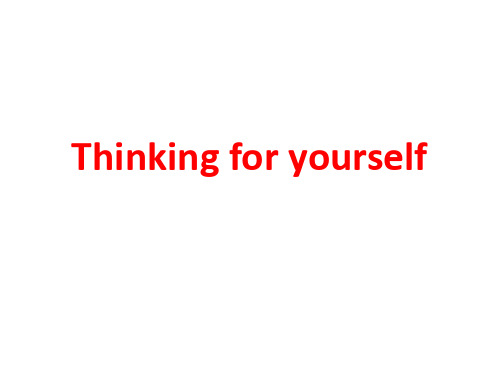
Difficult sentences
1. When was the last organizational vision statement you saw that included the words “…to develop ourselves into a model environment in which everyone at every level can think for themselves?” (Para 4)
2. I was reminded of this sad fact at a party when a fellow guest asked my the subject of a book I was planning to write.
What is sad? What does this choice of word tell us?
3. Expressing subjectivity in attributive clause (1) Some may suggest to send students to foreign countries for language learning, which amounts to washing hand of them.
3. Is it possible to teach someone to think for themselves?
Text structure
Thesis statement
Regarded with suspicion
- 1、下载文档前请自行甄别文档内容的完整性,平台不提供额外的编辑、内容补充、找答案等附加服务。
- 2、"仅部分预览"的文档,不可在线预览部分如存在完整性等问题,可反馈申请退款(可完整预览的文档不适用该条件!)。
- 3、如文档侵犯您的权益,请联系客服反馈,我们会尽快为您处理(人工客服工作时间:9:00-18:30)。
UNIT 3
独立思考
直到现在,独立思考仍然是一种激进的行为。
独立思考本该是一种普遍的行为,而事实却并非如此。
我们社会的每一次重大进步都源于独立思考。
然而,在大多数的生活圈子里,尤其是那些影响我们一生的地方——家庭、学校以及大部分工作场所——人们都对独立思考持怀疑态度。
有些机构甚至故意压制独立思考。
在有些人看来,那是一件危险的事情。
在一个晚会上,当一位客人问起我酝酿中的一本书的主题时,我再次想起了这个令人悲哀的事实。
我告诉他那本书谈论的话题是大家可以互相帮助,培养独立思考的能力。
“天哪,”他说,“我不认为那有什么好,我更喜欢服从命令的人。
”后来,我才知道他是一家大公司的第四代掌门人,而那家公司是世界上最大的石油公司之一。
“??在我们周围逐渐创建出一个模型环境,使各个层次的人都有独立思考的空间。
”你最后一次看到包含上述字眼的机构愿景陈述是在什么时候?还有,上一次有人问你:“你能跟我说真心话吗,真心话?”然后等着你做出翔实、充分的回答是在什么时候?
缺乏独立思考对我们来说是司空见惯的事情。
很少有人被鼓励去进行独立思考,更谈不上接受相关的训练。
他们的老师、父母和老板也是如此。
而且老师、父母和老板的老师、父母和老板也是如此。
(我们可能早就知道应该尊敬像苏格拉底那样的思想家,可是我们也知道,因为独立思考,他所在的城邦毒死了他。
这可绝不是给予他的毫无保留的支持与鼓励。
)
可是,我们偶尔也会遇到真心想培养我们独立思考的老师或导师。
他们让我们对独立思考的重要性有了浅略的认识。
13 岁时,我上了一门高级代数课。
授课的老师由于要求学生思考而背上了难缠的恶名。
第一天上课时,老师站在黑板前面说:“在你们面前的纸上写出一个数字的和。
”
全班35 个少男少女全都瞪大了眼睛看着她。
她重复了一遍指令:“写出一个数字的和。
”
我记得我握着铅笔的手出汗了。
有些人低下了头,握着手中的铅笔开始写了起来。
我真不知道他们到底在写什么。
我看见过道对面跟我坐同一排的那个女生向前探出身子,看看前面那个正胡乱写字的男生都写了些什么。
然后她飞快地写下了一个数字,并且马上用手盖住了。
老师来回踱着步,手里碾着粉笔。
我不知道她将在黑板上写什么。
这会儿,就剩下我一个人还什么都没写。
我往后一靠,向左侧过脸,悄悄地问我的朋友:“答案是什么?”“7,”她悄声说。
于是,我在纸上写下了“7”。
我一直低着头,想让自己看上去既忙着做题,又信心百倍。
在明显地感觉到我们的苦恼之后,老师问我们答案是什么。
大部分人都说是“7”。
她慢慢地走到黑板前写道:“根本就不存在一个数字的和。
” 我知道是这样的。
那你为什么不这么写呢?萨拉说是“7”。
你为什么要问她?因为---我不知道。
这就对了,从现在开始,要独立思考。
在后来的青春岁月里,我一见到这位老师就害怕。
在她面前,我根本就无法好好地思考。
但是,我记住了她的教诲,并且渐渐地开始审视它、珍视它。
我并不是劝大家像她那样,用羞辱别人的办法去教他们独立思考。
她当然没有给我们创造一个思考的环境。
要是她一开始就肯定我们的聪明才智,给我们讲讲独立思考的乐趣,要是她没有激起我们对她的畏惧,我们大家就能更深切地体会到独立思考的意义。
而且,我们在她面前也会更好地开动脑筋、思考问题。
但至少,她把独立思考的概念引入了我的学术生活。
